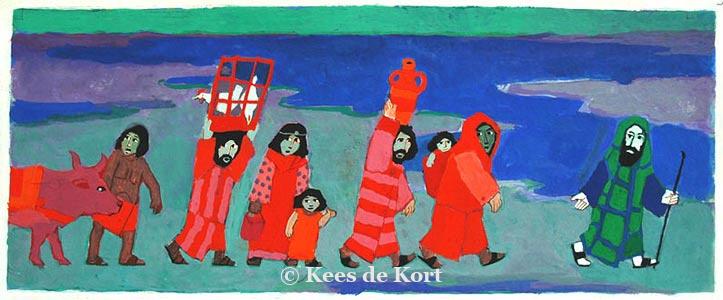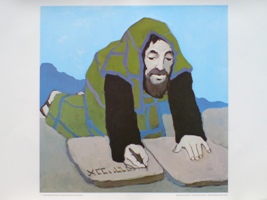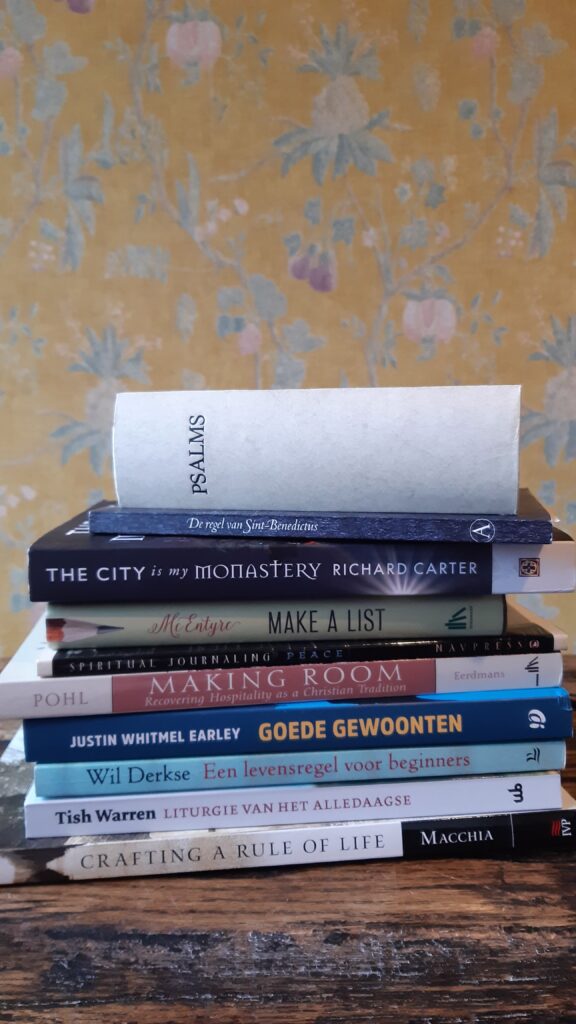On February 15, 2022, I placed a stack of books on my kitchen table that have inspired me in recent years to live by a rule of life. (The basis for my workbook).
When I looked at that stack, I thought: “There are a few more people who might find that interesting,” and I wrote a blog about it. I never translated it, but I will do that next week. You can see it here.
This year, I will go through all 10 books of the Rule of Life Literature List month by month in separate blog posts. Today, I’m starting with number 1. In this way, I will take you through the year and hope to encourage you to delve into a book.
Today I introduce you to the oldest written Rule of Life from the #1 of world literature: The most read book in the world. It’s ancient. I know.
Earlier on, when God unfolded his plan of creation, you may notice that the Creator likes framing: day and night, water and land, birds, fish and people; He creates separation and order in the chaos through demarcation.
In the Bible, Exodus 20, you can read the story of a trained shepherd named Moses. He led a gigantic nation through the desert for years. (circa 1300 BC) They traveled from Egypt to the land of Canaan.
His life story was not entirely standard. As a baby, he floated in a bulrush basket on the great river Nile. He was born to parents who lived in such a politically unsafe situation that they put him into the water in a basket, because otherwise he would certainly be killed anyway.
Floating on the water, he was found by a princess who let him grow up in the palace, where he learned all kinds of things that he would not have learned otherwise. All this was part of a Great Plan, because it prepared him for what would follow later.
He killed someone for the sake of justice, so he had to flee and live in the desert for about 20 years, where he learned to practice patience. He had a special experience at a burning bush and heard the voice of God in a unique way. And so his whole life seemed to be a preparation for what yet was to come: The redemption of the people of Israel from the slavery of Egypt.

(In this way, he was a forerunning representative of Jesus, who later came to rescue his people. There is much more to say and discover about this, but it’s too much to cover here.)
Back to Moses—he had no business plan, but everyone knew they were on their way to “The Land Filled with Milk and Honey”. They experience everything you can read about in the book of Exodus, which means “journeying out” Soon after they leave Egypt, chaos ensues. To regulate life and bring some order, Moses is given the Ten Commandments by God Himself.

There is thunder, and a voice speaks to Moses from a great black cloud. He writes down what he hears on two stone tablets. This is a summary of it:
“God gave the Israelites these important rules:
He said, I am the Lord your God. I brought you out of Egypt and freed you from slavery.
- Do not worship other gods, worship only Me.
- Make no graven images.
- Don’t just say my name without thinking.
- Celebrate the Sabbath, because it is a special day.
The first four commandments are about dealing with God and keeping peace: I am God, and I am first; put your trust in Me alone, and do not misuse My Name. Rest regularly. (Don’t walk on for too long now; tomorrow is another day on the road!)
The second part of the Commandments, 5 to 10, are about dealing with others. Respect your parents, don’t kill anyone, fight for your marriage, stay away from someone else’s property, speak the truth, and don’t be jealous.
- Have respect for your father and mother.
- Don’t kill anyone.
- Don’t cheat.
- Don’t steal
- Don’t tell lies about someone else to the judge.
- Don’t covet something that belongs to someone else. Stay away from his house, his wife and the rest of his property.

At that time, all the people heard the sound of thunder and of the trumpet. It must have been powerful to be there! They saw the lightning and the smoking mountain, they trembled and stood some distance away. They said to Moses, If you speak to us, we will listen, but God must speak to us no more. Because then we will die.
But Moses said, Do not be afraid. God has come to see if you trust him! He wants you to have reverence for Him because then you will do what He wants.
Then Moses went up to the dark cloud where God was present, and the people stood at a distance.
Well, that was an experience that we can still be impressed by a few thousand years later. God says something and underlines it with some natural effects such as thunder and a dark cloud—but not to incite fear. But It reminds me a bit of Aslan, who could roar with his voice, commanding kind respect because He is worth it.
I find it quite special that ten guidelines were given such a long time ago to regulate life with God. They were formulated in such a unique and overarching way that we can still do something with them today. Because as far as I’m concerned, they’re all still relevant.
What do you think?
Which of the ten guidelines do you find the most complicated?
And what do you see as slavery in our current times?
Don’t hesitat and feel free to respond and start a conversation.
Do you like what you read here? Share it or feel free to use and adapt this blog in your context.
